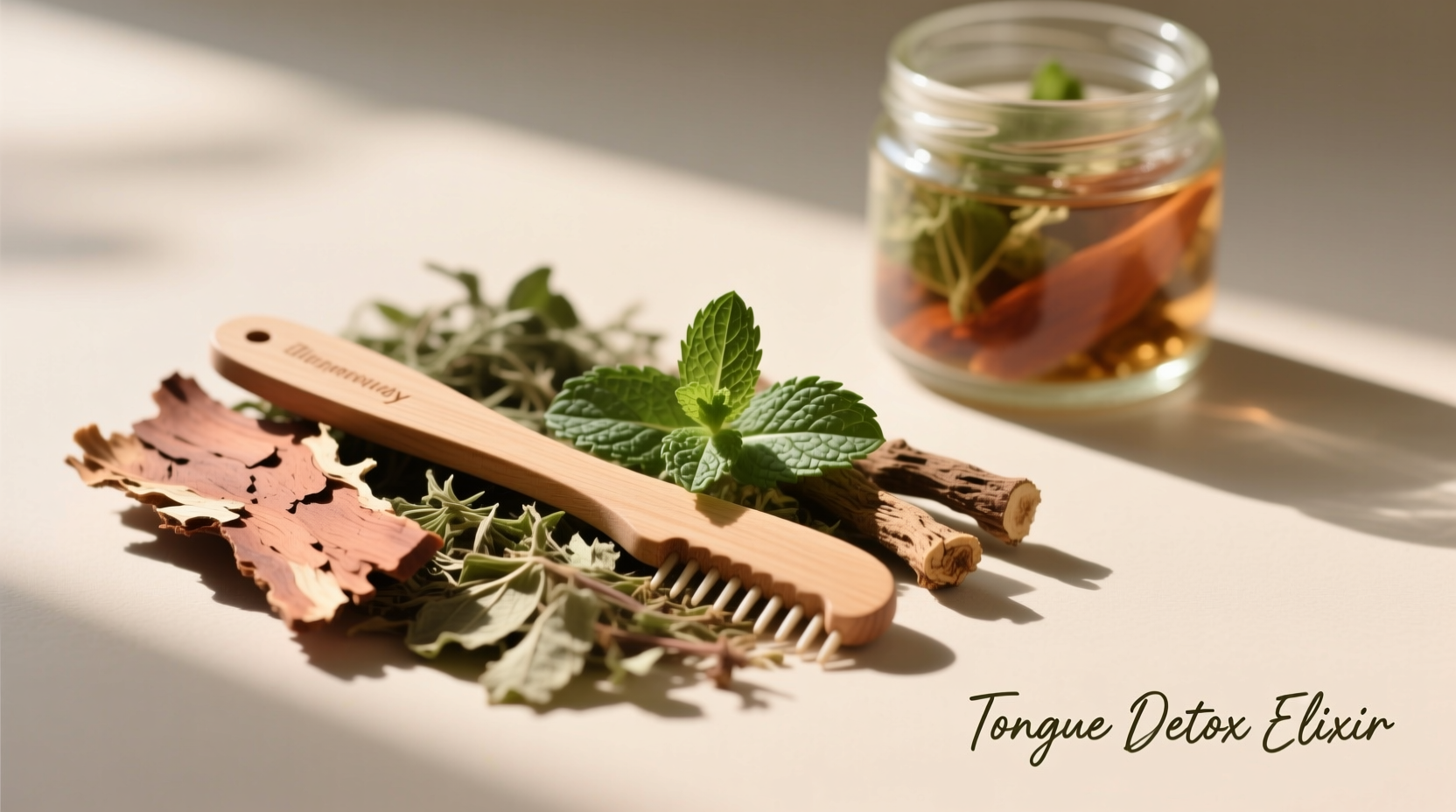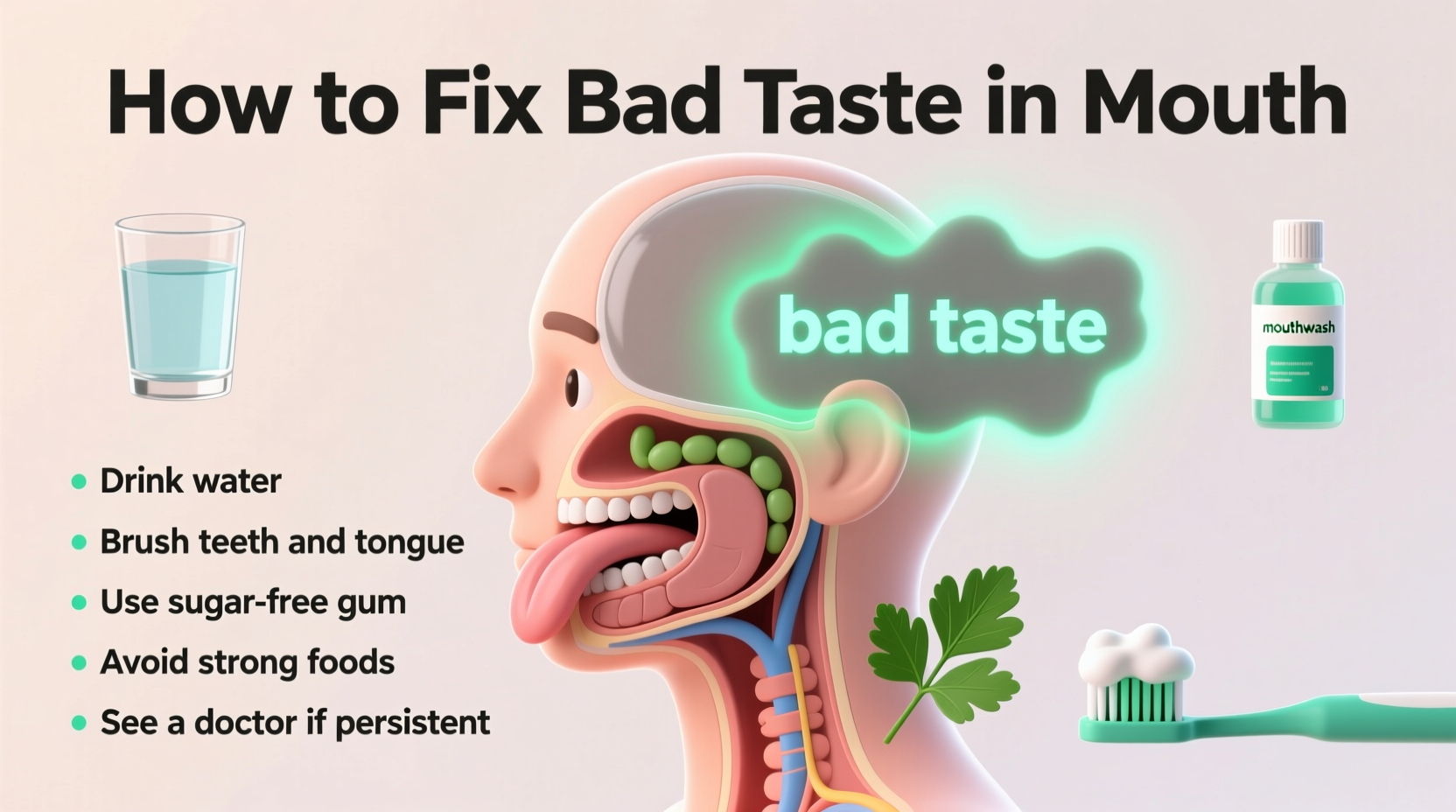If you've noticed a persistent metallic, bitter, or sour taste disrupting your daily life, you're not alone. Approximately 1 in 15 adults experiences dysgeusia (altered taste perception) at some point, according to the National Institutes of Health. While occasionally annoying, most cases stem from temporary, fixable causes rather than serious health conditions. This guide delivers science-backed solutions that actually work—no vague suggestions or unproven remedies.
Why Bad Taste Happens: Understanding the Root Causes
Before diving into solutions, understanding what's causing your unpleasant mouth sensation helps target the most effective remedy. The American Dental Association identifies three primary categories:
| Cause Category | Common Triggers | Time to Resolution |
|---|---|---|
| Oral Health Issues | Gum disease, poor dental hygiene, dry mouth | 3-7 days with proper care |
| Medication Side Effects | Antibiotics, blood pressure meds, antidepressants | Varies (consult physician) |
| Systemic Conditions | GERD, sinus infections, diabetes | Requires medical treatment |
This fact对照 table shows why identifying your specific cause matters—what works for medication-induced metallic taste won't necessarily help with acid reflux-related bitterness.
Immediate Relief: What to Do Right Now (First 24 Hours)
When that unpleasant taste strikes, these evidence-based methods provide the fastest relief:
1. Optimize Your Oral Hygiene Routine
Standard brushing often misses key areas contributing to bad taste:
- Tongue scraping: Remove bacteria buildup with a dedicated scraper (studies show 40% greater reduction in volatile sulfur compounds than brushing alone)
- Baking soda rinse: Mix 1 tsp with 8 oz water—neutralizes acids and creates an inhospitable environment for odor-causing bacteria
- Zinc mouthwash: Look for products containing zinc gluconate, proven to reduce metallic taste from medications
2. Strategic Hydration Techniques
Not all fluids help equally. Research from the Mayo Clinic shows these hydration methods work best:
- Cold water throughout the day (room temperature water actually preserves taste compounds)
- Green tea with lemon (antioxidants combat bacteria while citric acid resets taste receptors)
- Avoid alcohol-based mouthwashes—they dry oral tissues and worsen the problem

Medium-Term Solutions: Breaking the Cycle (Days 2-7)
If your bad taste persists beyond 24 hours, implement these targeted approaches based on your specific taste disturbance:
Metallic Taste Protocol
Common with medications or dental work:
- Eat zinc-rich foods: pumpkin seeds, cashews, chickpeas (zinc deficiency worsens metallic perception)
- Chew fresh parsley or mint leaves—chlorophyll neutralizes metal ions
- Avoid metal utensils which can intensify the sensation
Bitter/Sour Taste Protocol
Often indicates acid reflux or sinus issues:
- Elevate your head while sleeping (reduces nighttime acid reflux by 60% according to NIH studies)
- Consume alkaline foods: bananas, melons, oatmeal to neutralize acids
- Try apple cider vinegar diluted in water (paradoxically helps balance pH)
When Home Remedies Aren't Enough: Medical Red Flags
While most bad taste cases resolve with home care, certain symptoms require professional evaluation. The American Academy of Otolaryngology recommends consulting a healthcare provider if you experience:
- Bad taste lasting longer than 10 days without improvement
- Accompanying symptoms like unexplained weight loss or difficulty swallowing
- Sudden taste changes after starting new medication
- History of diabetes or kidney disease with persistent metallic taste
These context boundaries help distinguish between temporary discomfort and potential underlying conditions needing medical attention. Never ignore persistent taste changes—they can sometimes indicate serious health issues like undiagnosed diabetes or early-stage kidney problems.
Preventing Recurrence: Long-Term Oral Wellness
Once you've resolved the immediate issue, these preventive measures reduce recurrence:
Daily Oral Detox Routine
- Morning: Brush with baking soda toothpaste alternative
- After meals: Rinse with herbal tea (peppermint or ginger)
- Evening: Tongue scrape followed by coconut oil pulling (swish 1 tbsp for 15 minutes)
Dietary Adjustments That Make a Difference
Certain foods actively combat bad taste at the molecular level:
- Citrus fruits: Stimulate saliva production which washes away bacteria
- Crisp vegetables: Apples and carrots naturally scrub teeth surfaces
- Probiotic foods: Yogurt and kefir crowd out odor-causing bacteria
Special Considerations for Common Situations
Different scenarios require tailored approaches:
After Dental Procedures
Temporary metallic taste following dental work typically resolves in 3-5 days. Accelerate healing with:
- Avoiding hot foods for first 24 hours
- Using prescribed antimicrobial rinses
- Eating soft, bland foods initially
During Illness (Cold/Flu)
When congestion alters taste perception:
- Stay hydrated with warm broths
- Use saline nasal rinses to clear sinus passages
- Try strongly flavored foods (citrus, ginger) that cut through congestion
What Not to Do: Common Mistakes That Worsen Bad Taste
Avoid these counterproductive approaches:
- Overusing alcohol-based mouthwashes (dries oral tissues)
- Skipping dental checkups (hidden gum disease often causes persistent bad taste)
- Ignoring medication side effects (discuss alternatives with your doctor)
- Smoking or vaping (major contributor to chronic bad taste)
Remember that persistent bad taste in mouth could be your body's warning signal. While most cases respond well to home care, don't hesitate to seek professional evaluation when needed—your taste buds might be telling you something important.











 浙公网安备
33010002000092号
浙公网安备
33010002000092号 浙B2-20120091-4
浙B2-20120091-4